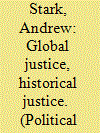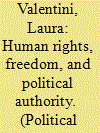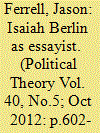|
|
|
Sort Order |
|
|
|
Items / Page
|
|
|
|
|
|
|
| Srl | Item |
| 1 |
ID:
115197


|
|
|
|
|
| Publication |
2012.
|
| Summary/Abstract |
The debates over global and historical justice much preoccupy contemporary political theory. Yet they have not been analyzed in tandem. And this, despite the fact that a number of theoretical frameworks, principal among them contractarianism and utilitarianism, configure arguments in both debates. In this essay, I show that such arguments, as advanced by either side in each of the two debates, all rest on a set of patterned assumptions about the nature of the self. Specifically, I argue, the debates over historical and global justice resemble each other as parallel contests over the physical, meta-social, metaphysical and social natures of the self. At their cores, the debates over historical and global justice thus display a common and symmetrical structure. I will also show that certain conceptions of the self underlying both the anti-historical justice and the anti-global justice positions are mutually inconsistent. Similar contradictions do not beset the pro-historical and pro-global justice positions.
|
|
|
|
|
|
|
|
|
|
|
|
|
|
|
|
| 2 |
ID:
115198


|
|
|
|
|
| Publication |
2012.
|
| Summary/Abstract |
In this article, I sketch a Kant-inspired liberal account of human rights: the freedom-centred view. This account conceptualizes human rights as entitlements that any political authority-any state in the first instance-must secure to qualify as a guarantor of its subjects' innate right to freedom. On this picture, when a state (or state-like institution) protects human rights, it reasonably qualifies as a moral agent to be treated with respect. By contrast, when a state (or state-like institution) fails to protect human rights, it loses its moral status and becomes liable to both internal and external interference. I argue that this account not only steers a middle course between so-called natural-law and political approaches to human rights but also satisfies three important theoretical desiderata-explanatory power, functional specificity, and critical capacity.
|
|
|
|
|
|
|
|
|
|
|
|
|
|
|
|
| 3 |
ID:
115199


|
|
|
|
|
| Publication |
2012.
|
| Summary/Abstract |
One of the largest contemporary debates in political theory revolves around the question of how pluralists can justify their political commitments. Isaiah Berlin, one of the first to face this problem, was a self-proclaimed liberal, whose political writings have led to controversy. In this essay, I take up the issue of how Berlin's use of the essay genre contributes to his defense of liberalism given his pluralist beliefs. I argue that while his reliance upon the essay generates particular interpretive problems, it need not undermine his commitment to liberalism. Rather, Berlin's defense of liberalism involves a rhetorical attempt to discredit alternatives to liberalism while drawing attention to suggestive ties between history, political judgment, and liberalism.
|
|
|
|
|
|
|
|
|
|
|
|
|
|
|
|
| 4 |
ID:
115200


|
|
|
|
|
| Publication |
2012.
|
| Summary/Abstract |
This essay engages critically with the recent emergence of "political realism" in political theory (centrally in the work of Raymond Geuss and Bernard Williams). While sympathetic to and convinced of the importance of the core of the enterprise which it identifies, the essay is critical of some of the claims made about the independence of politics from morality and the historically contingent character of political values, and suggests that realism may itself succumb to illusion. The final section sketches an account of the nature of evaluative judgment in the study of politics and, in conclusion, defends both the pluralist character of political theory and the pressing importance of the questions that realism raises and that are inadequately attended to by the bulk of post-war political theory.
|
|
|
|
|
|
|
|
|
|
|
|
|
|
|
|
|
|
|
|
|